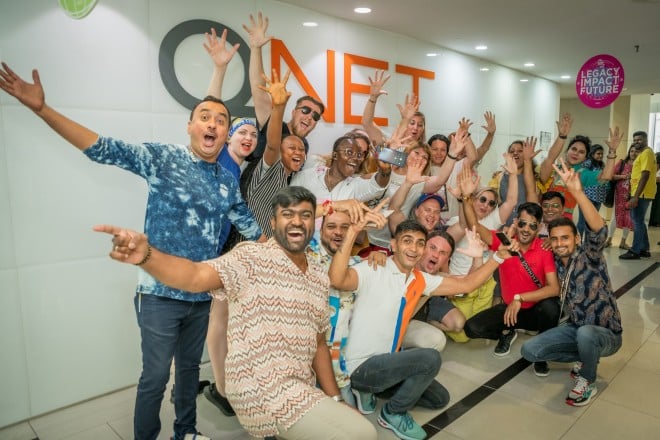
12 Mar QNET embraces Copilot for Microsoft 365 to supercharge productivity
[The content of this article has been produced by our advertising partner.]
Microsoft has recently rolled out Copilot for Microsoft 365, a powerful Generative AI tool that seamlessly integrates with Microsoft 365. This innovative solution is rapidly gaining traction among enterprises in different sectors, as it promises to enhance efficiency and streamline operations.
In short, Copilot for Microsoft 365 is a sophisticated processing and orchestration engine that provides AI-powered productivity capabilities by co-ordinating various components, including large language models (LLMs), content in Microsoft Graph, such as emails, chats, and documents that the user has permission to access, and the Microsoft 365 apps, such as Word and PowerPoint.

QNET stands out as an early adopter of Copilot for Microsoft 365, recognising its immense potential for driving operational efficiency. With its unique business model, the company is always looking for ways to make operations more efficient for employees and customers alike, says CIO Ivan Woo.

Woo recalls that in fact, about six or seven years ago, the company first explored artificial intelligence (AI), but at that time data quality and consistency posed significant challenges. As a comparison, today’s technology has greatly improved, making it a lot different, as Woo explains.
“Definitely AI can help our day-to-day people get their jobs done in a lot more effective manner,” he says. “But early discussions among company leaders have also raised concerns, particularly from the legal and finance departments. There were also fears that AI could potentially replace human workers.”
To address these concerns and reservations, QNET organised a series of pre-kick-off workshops in collaboration with SoftwareOne, a global end-to-end software solutions and consulting company.
The workshops demonstrated the potential value of the technology, while also providing an opportunity for people to discuss concerns regarding corporate responsibility and fears of being replaced by AI.
Equally important is that employees were reassured that while AI can reduce the time required to complete tasks, from hours to minutes, human involvement remains important, and is particularly so to ensure that analyses generated are based on real data and grounded in accuracy.
“Copilot for Microsoft 365 might help with 90%, but you still have to do that last 10%. That’s often the most difficult part,” says Woo.

Instead of having all employees adopt the tool in one go, QNET and SoftwareOne agreed that it would be better to have select users across different departments explore the technology’s potential.
These users were directed to come back with their suggested use cases within a month or so. In the meantime, SoftwareOne has scheduled other workshops and continued to collaborate with QNET about the best ways to measure success after different Microsoft 365 Copilot projects get underway.
Woo anticipates that the early adopters within his organisation will have completed their assessment of Copilot for Microsoft 365 by early 2024.
“By then, we should have hundreds of testimonials about how this AI-powered tool has made their work easier,” he says. “Eliminating waste is a good way to measure success, but testimonials supported by data are even more valuable.”
As the company begins its AI journey, there is a lot of enthusiasm surrounding the potential it holds. Already, there are promising indications that this interest could bring about numerous advantages for the organisation.
For example, Hazel Evangelista, a digital experience manager, expresses her anticipation of how Copilot for Microsoft 365 will assist her in various ways while creating documents for the organisation.
She acknowledges that although she still needs to edit, the tool helps overcome writer’s block, which would otherwise take her hours to overcome.
Other emerging use cases for this tool include transforming document wording into more professional language, formatting documents correctly, and analysing data in spreadsheets. Some others hope to use it to translate from different languages while gathering more AI use cases from other countries.
Since its launch on November 1, 2023, Copilot for Microsoft 365 has gained popularity among enterprise clients. Industry leaders like Visa, BP, Honda, Pfizer, and Chevron are already using the AI tool, alongside trusted partners including Accenture, EY, KPMG, Kyndryl and PwC, who have also placed their trust in this powerful tool.
.JPG?itok=u9o_aReq)
One of the features is its ability to provide personalised automation based on individual roles and preferences. For example, users can tailor the tool to match their specific needs and preferences, whether it’s regarding formatting, style, or tone.
Other personalisation features, such as “sound like me” for Copilot in Outlook, allow the user to match their unique writing style and voice when drafting emails.
The more recently announced Python in Excel feature enables users to perform sophisticated mathematical analysis using one of the most powerful programming languages in the world.
Microsoft has also announced powerful new capabilities that make Copilot for Microsoft 365 a full participant in collaboration. This helps everyone stay focused on the discussion in a Microsoft Teams meeting, turn notes from a brainstorm into visualizations on a digital whiteboard, and build shared workspaces in Microsoft Loop to facilitate team collaboration and ensure everyone stays in sync.
